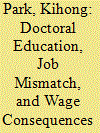| Srl | Item |
| 1 |
ID:
188933


|
|
|
|
|
| Summary/Abstract |
This study extends the previous literature on the wage effects of over-education, focusing on young doctorate holders (DHs). It also contributes to the conventional over-education literature on a causal relationship between over-education and wages by implementing techniques of propensity score matching (PSM). By tackling potential bias as a consequence of omitted variable bias via the PSM strategy, this study provides evidence of the negative influence of over-education on wages (i.e., the over-education wage penalty) once potential sources of bias are adequately considered. While the current analysis is focused on one country, South Korea, its results might be relevant for many other countries that have experienced a rapid expansion in the supply of DHs over recent years.
|
|
|
|
|
|
|
|
|
|
|
|
|
|
|
|
| 2 |
ID:
161861


|
|
|
|
|
| Summary/Abstract |
This paper studies the wage penalty of overeducation using the World Bank's STEP (Skills Towards Employability and Productivity) survey in China. Based on the measurements of cognitive, technical, and non-cognitive skills, the overeducated have systematically lower abilities compared with the well-matched, just as the skill heterogeneity theory predicts. Endogenous switching model is adopted to estimate the effect of overeducation on wage. We find that the overeducated workers with tertiary education suffer from significant loss compared with the well-matched workers, while overeducation has no significant effect on workers with high school education. The causality inference using nearest neighbor matching and propensity score weighted regression methods reveals that our conclusions are robust.
|
|
|
|
|
|
|
|
|
|
|
|
|
|
|
|